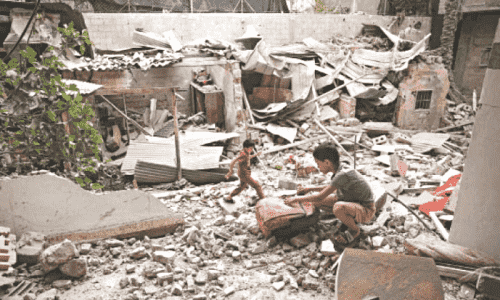CAIRO: With both parties blaming the other for the standstill, Hamas maintained its demand for a stop to the attacks in exchange for the release of captives, while Israeli Prime Minister Benjamin Netanyahu categorically rejected the possibility of a Gaza truce on Sunday.
Hamas negotiators stuck to their position that any truce agreement had to bring an end to the war during their second round of negotiations for a ceasefire with Egyptian and Qatari mediators, which concluded here in Cairo on Sunday.
As part of mediation efforts towards a truce in Gaza, a Hamas spokesman informed AFP that the group’s negotiators in Cairo were departing for Doha on Sunday after discussions concluded in the Egyptian capital. However, a source with knowledge of the discussions revealed that CIA director Bill Burns is also anticipated in Doha, where he would meet with the prime minister of Qatar to consider mediating the Gaza conflict.
Although Israeli Prime Minister Benjamin Netanyahu was earlier encouraged by French President Emmanuel Macron to negotiate a truce with the Palestinian organization over the phone, the latter did not demonstrate a desire to do so. Netanyahu restated Israel’s goal, which has been to permanently disarm and demolish Hamas since the war’s beginning some seven months ago.
After a shutdown order, Israeli police raid the Al Jazeera office; CIA and Hamas officials are allegedly
The Israeli prime minister said Tel Aviv was willing to only “pause” fighting in Gaza in order to secure the release of Israeli prisoners still being held by Hamas, believed to number more than 130. He blamed Hamas for remaining entrenched in its extreme positions.
Ismail Haniyeh, the leader of Hamas, responded to Netanyahu’s remarks by saying that his organization was still committed to achieving a comprehensive ceasefire that would put an end to Israeli aggression, ensure Israel’s withdrawal from Gaza, and result in a significant agreement to release Israeli prisoners in exchange for the release of Palestinian prisoners. Additionally, he held Netanyahu accountable for the aggression’s persistence, the conflict’s enlargement, and the subversion of efforts undertaken by different parties and mediators.
Since the Hamas attack on Israel on October 7, around 250 Hezbollah fighters and 75 civilians have been killed in Israeli strikes on Lebanon, according to security sources there. Approximately twelve Israeli troops and many civilians have been killed in Israel by rocket fire emanating from Lebanon, according to Israeli officials.
The health ministry in Gaza reports that over 34,600 Palestinians have been murdered by Israel’s attack, 29 of them have died in the last 24 hours, and over 77,000 injured.
Al Jazeera was shut down
Following a government decision to shut down the Qatari-owned TV station’s local activities, Israeli police raided a Jerusalem hotel room that Al Jazeera used as its de facto office on Sunday, according to an Israeli official and an Al Jazeera source.
Online footage surfaced showing plainclothes cops breaking down camera gear in a hotel room. The hotel was in East Jerusalem, according to the Al Jazeera source.
The network was shut down by Prime Minister Benjamin Netanyahu’s cabinet on the grounds that the “Qatari television network threatens national security” as long as the Gaza conflict lasts.
Al Jazeera described the action as criminal and dismissed the charge that the network was endangering Israeli security, calling it a dangerous and absurd fabrication that puts its reporters in peril. It declared that it reserved the right to take all available legal action.
The military assault by Israel in Gaza has drawn criticism from the network.








